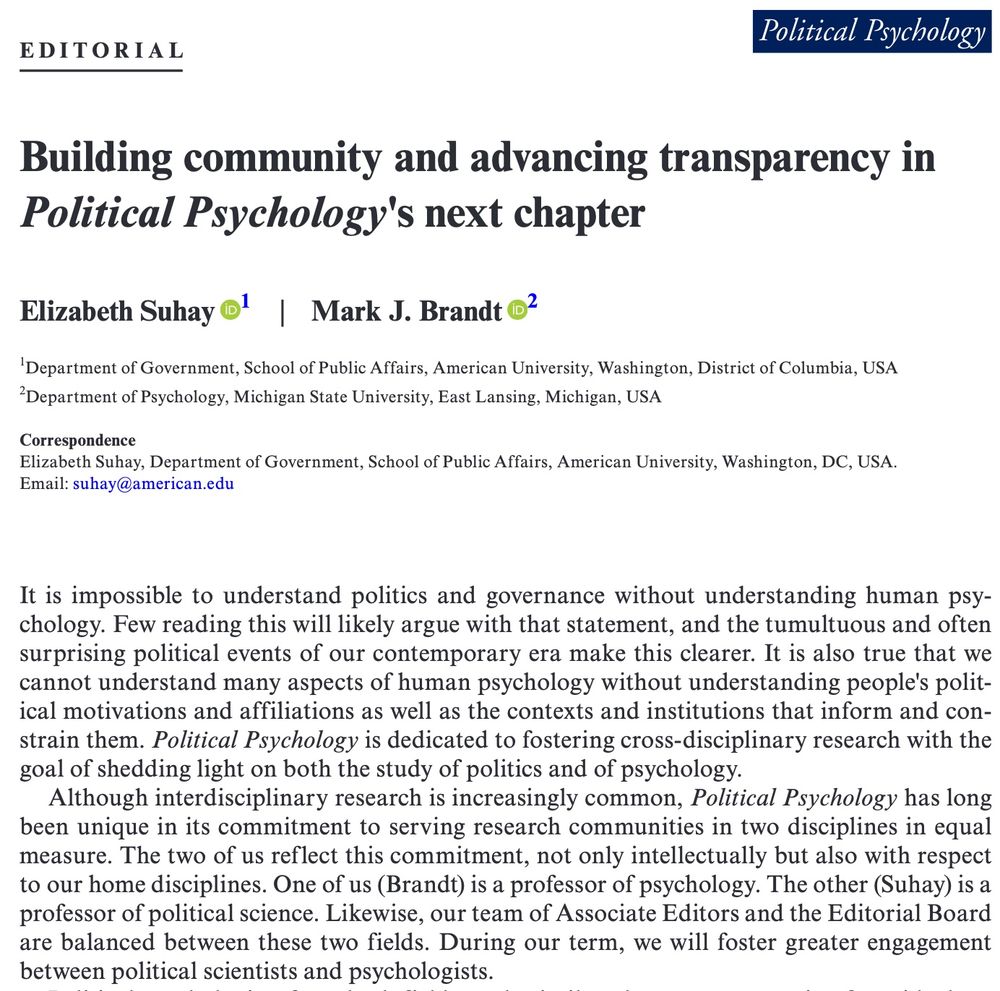
Extreme views are heavily over-represented on social media
Social platforms’ tendency to reward hostile content creates incentives that systematically reward simplistic messages and extreme positions and this fuels populism www.ft.com/content/9251... via @jburnmurdoch.ft.com
08.09.2025 22:02 — 👍 472 🔁 188 💬 22 📌 33
A cross‐cultural test of competing hypotheses about system justification using data from 42 nations
You have to enable JavaScript in your browser's settings in order to use the eReader.
Intersting study wirth 24 000 participants in 42 (!) countries that confirms one's intuitions: People are more likely to think the system they live in is fair if
they have a higher status and depending satisfaction in life (lower satisfaction--> system = bad)
and
if "their" party is in charge
01.09.2025 06:14 — 👍 43 🔁 9 💬 1 📌 0

Understanding how individual beliefs and societal values influence support for measures to prevent COVID-19 transmission and risk is vital to developing and implementing effective prevention policies. Surges in COVID-19 infections continue to be prevalent worldwide, and strategies to address the increase in vaccine hesitancy and related conspiracy theories are enacted globally. Using the lenses of the social identity approach and system justification theory, we examined how individual-level conceptualizations of identity, system legitimacy, conspiracy beliefs and trust in science, government and healthcare influence an uptick in COVID-19 vaccine adherence. Data from an international survey of adults from China, the Philippines and the United States (N = 358; Study 1) and a six-country two-wave stratified online sample (N = 6138; Study 2) allowed the present research to investigate how cultural values and governmental policies intersect with COVID-19 risk perception and vaccine hesitancy. The most robust findings were: (1) identifying with a superordinate global identity was associated with greater vaccine adherence; (2) having a stronger subordinate national identity was associated with greater vaccine hesitancy; and (3) the association between having a strong national identity and the endorsement of COVID-19 conspiracy theories was mediated by system justification. The results presented are used to discuss strategies for increasing vaccine uptake globally for future pandemics.
(1) Identifying with a global identity was associated with greater vaccine adherence
(2) Having a stronger national identity was associated with greater vaccine hesitancy
Open Access: onlinelibrary.wiley.com/doi/10.1111/...
#SocialPsyc #AcademicSky🧪
17.06.2025 12:34 — 👍 20 🔁 5 💬 0 📌 0

Comprehensive research (N=24k, 42 nations) by @evanavaldes.bsky.social et al suggests we’re not so much inclined to support (and justify) the social systems to which we belong, as to support those systems that serve our individual or group interests:
buff.ly/R1IHhQs
HT @jayvanbavel.bsky.social
30.08.2025 15:09 — 👍 7 🔁 5 💬 0 📌 0
“We used data comprised of 24,009 participants nested within 42 countries. Multilevel models largely supported the competing claims of social dominance and social identity theories over SJT.”
28.08.2025 18:15 — 👍 27 🔁 8 💬 1 📌 0

When & why do individuals defend the political systems they live in? Valdes et al. study the tenets of System Justification Theory in a paper from our August issue. Read open-access for their findings on what motivates people to see their system as just, fair, & legitimate. doi.org/10.1111/pops...
28.08.2025 16:52 — 👍 9 🔁 7 💬 0 📌 1
Born from AASP Summer School 2021, we explore how identity and system justification shape COVID-19 attitudes across 7 countries.
19.06.2025 03:00 — 👍 1 🔁 0 💬 0 📌 0
This paper is particularly special for me—it began as a project at the Asian Association of Social Psychology #AASP summer school in 2021, and it’s incredibly rewarding to see it come to life. We examined how identity and trust-related beliefs shape vaccine attitudes across 7 countries, using…
17.06.2025 12:11 — 👍 0 🔁 0 💬 0 📌 0

ICE ‘Grabbing People Out of Their Cars’ on Martha’s Vineyard
Immigration agents reportedly rounded up around 40 people in the course of several traffic stops on Tuesday.
ICE agents rounded up around 40 people today across Martha’s Vineyard—grabbing some out of their cars. The sweeps were carried out as part of a series of traffic stops with the help of FBI and DEA agents. “You should be ashamed of yourselves,” one person shouted at several agents gathered outside.
28.05.2025 21:47 — 👍 6552 🔁 2961 💬 730 📌 309
“In this paper, we argue that status threat arises because white Americans tend to perceive racial minorities as competing outgroups, not as fellow Americans… We find little indication that a shared American identity could reduce racial (and, in exploratory analyses, partisan) conflict in America.”
12.05.2025 18:16 — 👍 230 🔁 62 💬 10 📌 3

What DEI threatens isn’t merit. It’s monopoly.
Political science professor Hakeem Jefferson argues for DEI's importance to de-monopolizing universities.
A colleague at Stanford’s business school used The Stanford Daily to argue—poorly—against DEI. The piece was riddled with historical errors and left one searching for fact, so I broke my public writing hiatus to respond.
I hope you’ll read and share the piece.
stanforddaily.com/2025/04/22/w...
23.04.2025 00:23 — 👍 8475 🔁 2924 💬 15 📌 275

International Fellowships 2025
The International Fellowships Programme enables researchers to work for two years at a UK institution with the aim of building a globally connected, mobile research and innovation workforce.
If you're an early career researcher - perhaps based in a fledgling authoritarian state - and want an out, @britishacademy.bsky.social offer 2-year fellowships to come to a UK university (including relocation costs and research funds).
www.thebritishacademy.ac.uk/funding/inte...
08.02.2025 10:42 — 👍 313 🔁 251 💬 13 📌 11

Screenshot of first two paragraphs of the editorial "Building community and advancing transparency in Political Psychology's next chapter" (Authors are Liz Suhay and Mark Brandt). The first two paragraphs read, It is impossible to understand politics and governance without understanding human psychology. Few reading this will likely argue with that statement, and the tumultuous and often surprising political events of our contemporary era make this clearer. It is also true that we cannot understand many aspects of human psychology without understanding people's political motivations and affiliations as well as the contexts and institutions that inform and constrain them. Political Psychology is dedicated to fostering cross-disciplinary research with the goal of shedding light on both the study of politics and of psychology.
Although interdisciplinary research is increasingly common, Political Psychology has long been unique in its commitment to serving research communities in two disciplines in equal measure. The two of us reflect this commitment, not only intellectually but also with respect to our home disciplines. One of us (Brandt) is a professor of psychology. The other (Suhay) is a professor of political science. Likewise, our team of Associate Editors and the Editorial Board are balanced between these two fields. During our term, we will foster greater engagement between political scientists and psychologists.
Today is the first day @lizsuhay.bsky.social & @mjbsp.bsky.social are co-EiC 🥳
Read the vision statement!
💲 onlinelibrary.wiley.com/doi/10.1111/...
🆓 osf.io/nybxm
Submit your papers! onlinelibrary.wiley.com/page/journal...
13.01.2025 15:10 — 👍 48 🔁 17 💬 1 📌 3

The Fraudulent Science of Success
Business schools are in the grips of a scandal that threatens to undermine their most influential research—and the credibility of an entire field.
In 2023, Harvard Business School suspended a star professor over charges of research misconduct.
As it happens, one of her papers also had funny data from a *different* B-school superstar -- a "mad, fraudulent unicorn,” per @jamesheathers.bsky.social... (1/3)
www.theatlantic.com/magazine/arc...
19.11.2024 16:20 — 👍 202 🔁 80 💬 15 📌 32
And here's the first starter pack with 150 social psychologists included.
go.bsky.app/J4gmGmV
#SocialPsyc #Psychology #AcademicSky 🧪
07.11.2024 19:35 — 👍 26 🔁 7 💬 6 📌 2
Here's a political psychology starter pack. For scholars of public opinion and persuasion in the realm of politics. bsky.app/starter-pack...
10.11.2024 17:31 — 👍 56 🔁 33 💬 2 📌 0
Professor at NorthwesternU's Kellogg School of Management. Studies psychology of hierarchy, inequality, conflict, and dehumanization.
Faculty webpage: http://www.kellogg.northwestern.edu/faculty/directory/kteily_nour.aspx
Professor at Northwestern/Kellogg • Author of THE ALL-OR-NOTHING MARRIAGE • Co-host of the LOVE FACTUALLY podcast • Co-director of the CENTER FOR ENLIGHTENED DISAGREEMENT • Post about relationships (sex, marriage) and politics (polarization, free speech).
associate prof of psychology at brooklyn college & cuny grad center, & assoc prof of phil at cuny grad center; interested in moral psych—how people judge what is right and wrong, and what they do with those judgments
Social psychologist at University of Greenwich. Associate editor at Peace and Conflict. Views are my own.
Post-doc at NYU AD
PhD at University of Amsterdam
Political and social psychologist
Decolonial psychology, stereotypes, ideology, inter- and intra- group relations; trust in scientists; systemic social psychology
We are the Center for Social Psychology at @UniBasel | sharing news & research of our members and others!
Professor of Sociology, Psychology, & Org Behavior
@ Stanford. Director of Polarization and Social Change Lab (@pascl-stanford.bsky.social), Co-Direct Stanford Center on Philanthropy and Civil Society. Obsessive basketball fan
PhD student in social psychology at @unistra.fr
Associate Professor of Teaching in Psychology at UBC. Interested in embedding best practices for memory and learning into OERs. Also, classroom diversity, intergroup contact, creating classroom community and how to foster social and academic belonging.
Assistant Professor of psychology at Pace University’s Pleasantville campus. Interested in political psychology, replicability, and methods. 🏳️🌈
Interested in how the rich stay rich and the poor poor. Sociologist at @sriucl.bsky.social @ucl.ac.uk. He/him/his. http://perengzell.com Photo bomber @simoneschneider.bsky.social
"truly enthusiastic trust nerd" (Möllering, 2023, p. 96)—assoc prof @ Mich State University—EIC @ Journal of Trust Research
Professor passionate about student success & team science #firstgen #Brassica enthusiast walking Dogs of the Plant World
#Agriculture #Food #HigherEd #EduSky #Agsky #SciComm & more
#Soil #Crop #Science ; opinions mine
PhD Researcher @QUB | Social and Developmental Psychology | she/her
🌈Kids in Context research centre https://www.qub.ac.uk/research-centres/kidsincontext/
Social psychologist Ph.D. | Exploring trust, future thinking, environmental behaviour and much more! | Senior Researcher @UniBasel, formerly @UniKent 🇬🇧 and @UniGeneva 🇨🇭
Neuroscientist and Psychologist at Vassar College. https://pages.vassar.edu/bergstromlab/
Associate Prof at Rutgers-Camden, father, husband, Chicano, social psychologist, first-gen student studying meaning in life & nostalgia
Postdoctoral Researcher at The Ohio State University studying intellectual humility, political psychology, conflict resolution, and trust in science
Asst Prof, UC Berkeley, Political Science. Study protests, stats & race: 1/ Agenda Seeding http://j.mp/agenda-seeding 2/ Race as a Bundle of Sticks http://j.mp/bundle-of
The Social Psychology Research Group in the School of Psychology, is a group of social and personality psychologists whose research focuses on social emotions and judgements, gender and sexuality, the self and interpersonal relationships.












